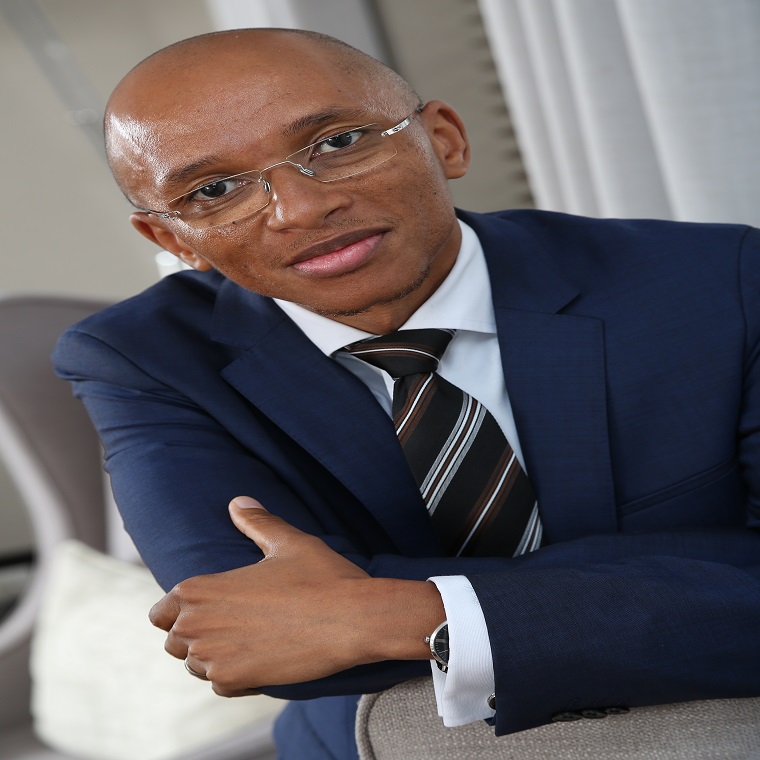Broadcasting
Across the Generational Divide, Businesses Can Win with Generative AI that’s Safe, Accurate, and Easy-to-Use

Zuko Mdwaba, Salesforce Area VP / Africa Executive & South Africa Country Leader
Generation Z will determine the extent to which generative AI will truly advance how we live and work.

Photography for SAS in April 2017 by Jeremy Glyn.
Born into a world of smartphones, virtual assistants, and the Internet, the level of comfort among ‘digital natives’ with the pace of technological change and its impact on society will be a driving force behind AI’s widespread adoption.
Global research released by Salesforce – Generative AI Snapshot Research: The AI Divide – shows that over one-third of current users are “super-users,” tapping generative AI daily and planning to use it even more. The data also shows that half of all consumers have never used the technology and claim their knowledge of generative AI is limited or non-existent.
Specifically among Gen Z, Salesforce research shows that 70% of Gen Z uses the technology – compared to only 23% of Baby Boomers – and almost half believe they are on their way to mastering it.
However, Gen Z’s ability to trust generative AI is just as important as its ability to make everyone’s life easier. Perhaps more than any other generation, they demand technology with a conscience. They want to understand how generative AI works and ensure it is secure or safe. They want to be confident, for example, that their information won’t be used elsewhere without their consent.
There’s good news for businesses worried about consumers who self-report as non-adopters, unfamiliar with generative AI and unclear how the technology will impact their life. Nearly half say they would use generative AI if it was easier to use or integrated into technology they already have. 51% say things might change if companies were more transparent about how they were using it.
There are three steps leaders can take as they explore, build, and implement successful AI platforms.
1) Bridge the gap between how Gen Z uses AI and how they want to use it
Despite the hype around how it can make our lives easier, 38% of generative AI users are only using it for fun.
That being said, Gen Z is keen to leverage AI in the workplace to help streamline their productivity. They also want it integrated into the tools they’re already using. As organisations build and implement AI, focusing on tools that make workers more productive can increase adoption and decrease resistance, accelerating a company into the future.
2) Embed transparent and ethical AI practices
In order to address the ethical concerns of Gen Z, including issues like bias, privacy, and data transparency, and to uphold their trust, it’s important that leaders guarantee that AI tools and platforms offer transparent explanations for their actions. In specific instances, it may be necessary to involve a human in the process to rectify any issues or errors.
3) Foster collaboration amongst those that are comfortable with generative AI, and those who make those business decisions
The employees responsible for the everyday decisions that drive a company forward are the ones that, according to the research, do not currently leverage generative AI and don’t fully comprehend it. This knowledge gap leads to differing opinions on where resources should go and technology funding priorities.
If companies fail to bridge the divide between AI proponents and those who are resistant to it, they are likely to encounter challenges in effectively harnessing the potential of this emerging technology.
Broadcasting
5 Things You Absolutely Need to Know About BBNaija Season 10


Broadcasting
E-commerce Lessons for Scaling Nigeria’s Food Distribution

By Diana Tenebe, Chief Operating Officer, Foodstuff Store
Nigeria stands at the cusp of an agricultural revolution with the ambitious plan to significantly transform its food and agriculture sector through the launch of the $510 million Special Agro-Industrial Processing Zones (SAPZ), financed by the African Development Bank and development partners. Fueled by the integration of cutting-edge technologies aimed at boosting food production and ensuring national food security. However, as yields increase, a formidable hurdle remains: the efficient and scalable distribution of this bounty across the nation’s diverse landscapes, often hampered by infrastructural limitations and logistical complexities.

Dr. Bosun Tijani, the Minister of Communication, Innovation, and Digital Economy, recently called on Nigerian farmers to prepare for digital and technologically advanced farming methods, emphasising their crucial role in boosting food production and security. Building upon this call for technological integration, and to truly unlock the full potential of Nigerian agriculture and ensure increased harvests translate to accessible and affordable food for all, the sector can draw invaluable lessons from the operational prowess of e-commerce giants like Amazon. Their success in navigating complex logistics and reaching vast customer bases offers a compelling blueprint for transforming Nigeria’s food distribution network.
Amazon’s dominance in the e-commerce realm is underpinned by a meticulously crafted logistics and supply chain system. Their significant investments in sprawling fulfillment networks, coupled with the strategic deployment of technology for route optimisation and real-time inventory tracking, have created an unparalleled engine for moving goods swiftly and efficiently. Furthermore, their optimisation of last-mile delivery, integration of automation within warehouses, and a hybrid approach blending in-house capabilities with shrewd partnerships underscore their commitment to scalability. This intricate ecosystem is designed to handle massive volumes and adapt to fluctuating demands – a crucial capability that Nigeria’s agricultural sector desperately needs.
Translating these principles to the Nigerian context requires a fundamental shift towards building a resilient delivery infrastructure specifically tailored for agricultural produce. This necessitates moving beyond traditional, often inefficient methods and embracing hybrid transportation models that account for varying road conditions and geographical challenges. Imagine a network that leverages a combination of refrigerated trucks for long-haul transport, smaller vehicles for navigating local terrains, and even innovative solutions like riverine transport where feasible. Integrating technologies like GPS tracking for real-time visibility of produce movement and strategically establishing a network of collection and distribution hubs across key agricultural zones can significantly streamline the flow of goods.
Implementing robust systems for real-time tracking of harvests and produce, mirroring Amazon’s inventory management, will be crucial in minimising spoilage and maximizing freshness as food travels from farm to consumer. Moreover, forging strategic alliances with existing local logistics providers, leveraging their on-the-ground knowledge and infrastructure, can provide a vital springboard for building a comprehensive network without starting entirely from scratch.
Beyond the physical movement of goods, the power of data, a cornerstone of Amazon’s success, holds immense potential for revolutionising Nigerian food distribution. Leveraging data analytics can provide invaluable insights into regional demand patterns, allowing for more accurate forecasting of optimal harvest and distribution times. This data-driven approach can help match agricultural supply with consumer needs with greater precision, reducing waste and ensuring that the right produce reaches the right markets at the right time – much like Amazon utilizes data for personalized recommendations and understanding customer purchase behavior. Imagine farmers making informed decisions about planting based on predicted market demands or logistics providers optimizing routes based on real-time demand fluctuations.
Furthermore, adopting Amazon’s unwavering focus on customer convenience and trust is paramount, especially when dealing with perishable goods. Establishing reliable delivery schedules, ensuring the quality and freshness of produce upon arrival, and implementing transparent processes throughout the supply chain are crucial for building confidence among both farmers and consumers. This might involve implementing quality control measures at various stages, providing clear communication about delivery timelines, and potentially even exploring traceability systems that allow consumers to understand the journey of their food.
Finally, navigating the complexities and dynamism of the Nigerian market demands a long-term vision and a high degree of adaptability, mirroring Amazon’s sustained focus and agility in the ever-evolving e-commerce landscape. The Nigerian agricultural sector must be prepared to iterate, learn from its experiences, and continuously refine its distribution strategies in response to local challenges and opportunities. This requires a collaborative approach involving government agencies, agricultural organisations, technology providers, and logistics companies working together to build a sustainable and efficient food distribution ecosystem.
By strategically adapting these e-commerce-inspired lessons in logistics, technology adoption, data-driven decision-making, and customer focus to the unique context of Nigerian agriculture, the nation can forge a distribution system capable of efficiently handling increased production. This transformative approach is not merely about moving food; it’s about ensuring that the fruits of Nigeria’s agricultural advancements reach every corner of the country, contributing significantly to food security, mitigating the rising cost of food, and ultimately cultivating a thriving and efficient agricultural future for all Nigerians.
Broadcasting
Afreximbank Unveils Third Edition of Short Film Competition ‘Creative Africa Nexus’

Creative Africa Nexus (CANEX), an intervention by African Export–Import Bank (Afreximbank) has announced the third edition of its vibrant short film competition, CANEX Shorts, that is designed to recognise and celebrate talents of young filmmakers from Africa and the Diaspora.

Filmmakers between the ages of 18 and 35 years can enter the competition for a chance to win a cash prize of $2,000 for outstanding work in each of the competition’s three categories: Best Fiction, Best Documentary, and Best Animation.
To be eligible, they must be Africans living on the continent, in the diaspora or the Caribbean. Each filmmaker can only enter one film for which they must hold all rights. The entered films should have been produced in 2023 or after and can be in any language.
Besides the cash prize, CANEX Shorts winners will also get an opportunity to participate and have their films screened at CANEX at IATF2025, which will take place in Algiers, Algeria, from September 4th to 10th, 2025, a statement explained.
This will also provide them with a chance to connect with potential investors and partners in what has become the largest gathering of creatives on the continent.
“To enter the competition, filmmakers are required to submit their films, not more than five minutes long, via the Film Freeway digital platform (https://FilmFreeway.com/CANEXShorts). From all entries, the selection committee will curate a shortlist of 30 films – 10 films per category for submission to the jury that comprises, well-respected film experts from across the continent. The jury will then select a winning film in each of the categories during CANEX at IATF2025.
“The 2024 CANEX shorts winners were unveiled at CANEX WKND 2024. The winning films were: Silent Screams by Esenaga Mbwe (Botswana) in the CANEX Shorts Best Fiction category; We Shall Not Forget by Brian Obra (Kenya) in the CANEX Shorts Best Documentary category; and Room-5 by Francis Y. Brown (Ghana) in the CANEX Shorts Best Animation category.
“According to the jury, the quality of films submitted during CANEX WKND 2024 was exceptionally high, necessitating award of two Special Mentions: Vodoun Nouminssin and Rain Is Not the Cloud’s Last Parade,” the statement added.
CANEX at IATF2025, where the winners will be unveiled, would also provide a unique platform for nurturing business, investment opportunities, collaboration, partnerships and inspiration amongst the creatives fraternity across value chains of diverse creative and cultural industries from film, music, and fashion to culinary arts, sports, and visual arts amongst others.
The event participants will include creatives, policymakers, financial institutions, business and political leaders, development partners, thought leaders as well as some of the most respected names in the Creative and Cultural Industries from across the continent and the diaspora.
Highlighting the importance of the competition, Executive Vice President, Intra-African Trade and Export Development at Afreximbank, Mrs. Kanayo Awani said: “Africa’s film industry, estimated at over $5 billion is thriving and brimming with untapped potential,” adding, “At Afreximbank, we are committed to unlocking this immense value by supporting platforms like CANEX Shorts that aim to propel African storytelling to the global stage. By investing in our creatives, we are not only creating jobs and economic opportunities; we’re actively ensuring Africa’s vibrant culture and talents gain global recognition.”

 Broadcasting3 days ago
Broadcasting3 days ago5 Things You Absolutely Need to Know About BBNaija Season 10

 Telecom3 days ago
Telecom3 days agoNigerians May Pay More for Calls, Data as Senate Okays 5 Percent Excise Duty

 E-Financial3 days ago
E-Financial3 days agoW’Bank Says Cash Transfer Missed Millions of Needy Nigerians

 E-Business3 days ago
E-Business3 days agoNCC to Checkmate $3Bn Digital Piracy Market

 E-Business3 days ago
E-Business3 days agoNIMC Launches NINAuth Digital Identity Verification App for Govt Services

 General News3 days ago
General News3 days agoEFCC Tells Nigerians to Shun Ponzi Schemes Like CBEX, Others

 Telecom3 days ago
Telecom3 days agoMastercard Report Reveals Top Travel Trends Shaping Africa in 2025

 E-Financial3 days ago
E-Financial3 days agoCBN, NIBSS Unveil BVN Platform for Diaspora Nigerians


























